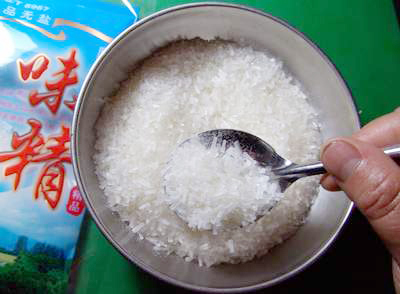(单词翻译:单击)
Chinese restaurant syndrome is the popular slang for allergies or adverse reactions that some people claim they get after eating food containing the flavour-enhancer monsodium glutamate, or MSG, that is widely used in many processed foods and also added to many Asian dishes.
中国餐馆综合症是流行用语,指有些人声称的在进食了含增强鲜味的味精(monsodium glutamate,或简称MSG)之后所产生的过敏或不良反应。味精被广泛用于食品加工,也被添加到许多亚洲菜肴中。

What is amazing about the publication of this research is not that it concludes MSG allergy is a myth, but that a scientific journal still needs to bother debunking such pseudoscience at all. As the New York Times put it in an article by Julia Moskin published last year, "'Chinese restaurant syndrome' has been thoroughly debunked (virtually all studies since then confirm that monosodium glutamate in normal concentrations has no effect on the overwhelming majority of people)".
这项研究报告的令人惊讶之处,并不在于它作出了“味精过敏是一个谬论”的结论,而在于一份科学杂志仍然需要不厌其烦地揭露伪科学的谎言。正如去年《纽约时报》朱莉娅·莫斯金的文章所说,“‘中国餐馆综合征’一说已被彻底揭穿(几乎所有的研究已经证实,正常浓度的味精对绝大多数人不造成影响)”。
This newspaper published an article in 2005 by Alex Renton that says "at no time has any official body, governmental or academic, ever found it necessary to warn humans against consuming MSG".
这份报纸在2005年曾发表了一篇署名阿莱克斯·莱顿的文章,文中说道:“从来没有任何正式的政府或者学术机构认为有必要对人们使用味精发出警告”。
Renton also writes about experimenting on a friend of his named Nic, who claimed to have adverse reactions to MSG: Renton feeds him a meal full of the MSG and closely related naturally occurring glutamates that are found in a huge range of foods including tomatoes, cheese, Marmite, seaweed and Worcester sauce. But Nic feels no pain or adverse reaction after his glutamate-stuffed meal.
莱顿在文章中还谈到自己在朋友尼克身上所做的实验。尼克声称对味精有不良反应,于是,莱顿在给他吃的菜肴里加了味精,或者加了与味精密切相关的天然谷氨酸——许多食物含谷氨酸,如番茄、奶酪、酵母提取物、海草和辣酱油等。不过,尼克在吃完一顿富含谷氨酸的饭菜之后,并没有感到哪里疼痛或有什么不良反应。
That's because he did not know he was eating MSG and other glutamates: like everyone else who complains of allergy or adverse reactions to MSG, Nic has psyched himself into believing that the benign substance makes him feel bad.
原因在于他不知道自己吃了味精或其他谷氨酸:像其他任何一个抱怨对味精过敏或有不良反应的人一样,尼克已经神经过敏了,误以为这种良性物质会让自己感到不舒服。
In China, where I live, you don't hear many complaints about MSG allergy. They're too busy gorging themselves on the stuff. Chinese people consume 1.6m to 1.8m tonnes of MSG crystals every year, according to China's "MSG King" Li Xuechun, chairman of the Fufeng Group--a company that grew big enough to list on the Hong Kong stock exchange thanks to sales of MSG.
在我生活的中国,你很少会听到味精过敏一类的投诉。人们对这玩意儿爱得不亦乐乎。根据中国“味精大王”阜丰集团(一家因销售味精而发展起来在香港联交所上市的公司)的董事长兼总裁李学纯的测算,中国人每年的味精消费量在160万至180万吨左右。
Most restaurants and home kitchens in China have a big bag of MSG crystals, known in Chinese as weijing, or "flavour essence", and they toss it liberally into all kinds of savoury dishes. Even chefs who don't use glutamate crystals use soy sauce in most recipes, and soy sauce tastes good precisely because it's chock full of glutamates.
在中国,大多数餐馆和家庭厨房都有一大袋MSG结晶体,中文称作味精,或“调味品”,人们在各种风味的菜肴里都搁上一点儿。即使不使用谷氨酸晶体的厨师,也会在大多数菜肴里加点酱油。酱油口味鲜美,正是因为含有丰富的谷氨酸。
Your clothes, your kids' toys and most of the stuff you own was probably produced in factories in southern China by migrant workers who power through their overtime shifts by eating instant noodles, of which MSG is a vital ingredient. Instant noodles form a big part of the diet of the country's more than 20 million university students, and you certainly don't hear any of them complaining about Chinese restaurant syndrome.
你穿的衣服、你孩子的玩具、你的大部分物品可能就是中国南部的农民工加班加点生产的,而给他们身体提供动力的是速泡面--味精是其中不可或缺的配料。速泡面也是中国2000多万大学生的重要食品,你肯定没有听到他们哪个在抱怨患了“中餐馆综合症”。
Nor do Italians complain about headaches after eating parmesan cheese (which tastes good because of the glutamates in it), Japanese don't worry about eating too much seaweed or dried shrimp (ditto), and even in Britain you don't often hear whining about adverse reactions to Marmite (ditto); you certainly don't get warnings from your doctor about the dangers of human breast milk to babies (ditto).
意大利人吃完巴尔马干酪(口味绝佳,因为含谷氨酸),没有抱怨头痛;日本人没有担心海藻或虾米吃得过多(理由同上);甚至在英国,你很少听到有关酵母提取物引发不良反应的牢骚(理由同上);你也肯定无法从你的医生那里得到母乳喂养婴儿会有危险的警告(理由同上)。
The fact is that unless you're eating bucket-loads of the stuff, MSG and its naturally occurring cousins are not going to do you any harm.
事实是,除非你把味精当饭吃,否则它和它的天然表兄不会对你造成任何伤害。
The persistence of the Chinese restaurant syndrome myth is a symptom of the hypochondria that has become fashionable in contemporary Anglo-American culture, and the failure of our educational systems to teach people the difference between quackery and hard science.
对“中餐馆综合症”谬论的固执坚持其实就是一种臆想症的症状,它已经成为当代英美文化的时尚,也是我们教育体制的失败——因为它没有教会人们如何辨别江湖骗术和自然科学。


